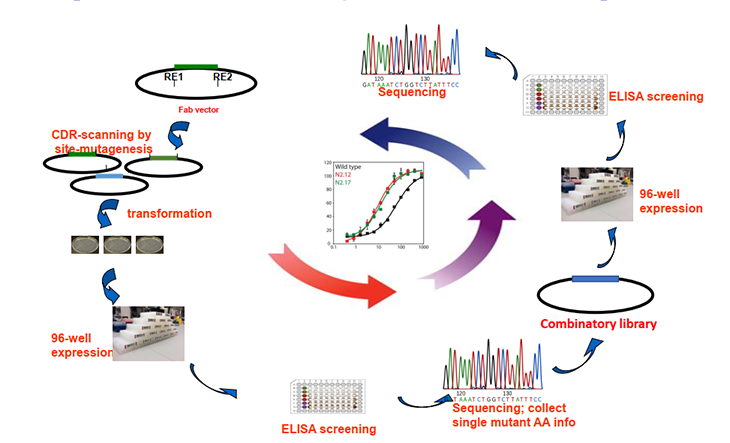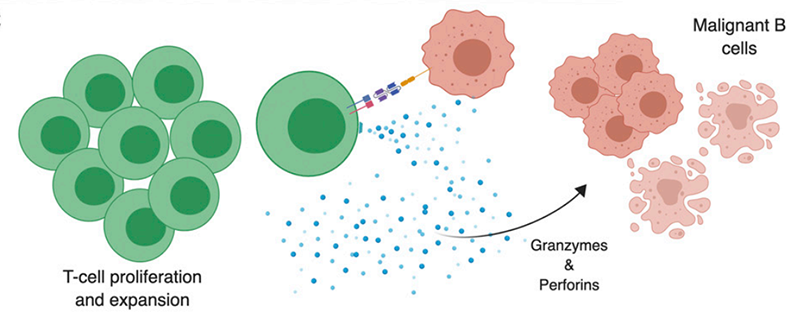| Drug Name | CD3xBCMA-bsAb |
| Description |
CD3xBCMA-bsAb, a novel bispecific antibody concomitantly targeting BCMA, highly expressed on multiple myeloma (MM) cells, and CD3 on T cells, is obtained by self-developed human natural phage antibody display library. CD3xBCMA-bsAb directs the cytolytic activity of T cells selectively to MM cells, leading to the apoptosis of tumor cells. Simultaneously, activation of T cells leads to transient release of cytokines to broaden the immune response against the tumor tissue. |
| Target | CD3; BCMA |
| Drug Modality | Bispecific antibody |
| Indication | Multiple myeloma |
| Product Category | Immunotherapy |
| Mechanism of Action | Activating T cells to kill multiple myeloma cells |
| Status | Preclinical |
| Patent | Granted |
Protheragen Inc. is actively seeking partnership for CD3xBCMA-bsAb. Potential collaboration can be strategic alliance, licensing, or marketing agreement.
We look forward to hearing from you.
| Introduction | The CD3 antigen is a protein complex composed of four distinct chains: CD3γ chain, CD3δ chain, and two CD3ε chains. These chains are highly homologous cell surface proteins that are members of the immunoglobulin superfamily and contain a single extracellular immunoglobulin domain. The transmembrane region of these CD3 chains is negatively charged, allowing them to associate with the positively charged T cell antigen receptor (TCR) chains (TCRα and TCRβ). The intracellular tails of the CD3 chains contain a single conserved motif, known as an immunoreceptor tyrosine-based activation motif (ITAM) which is essential for the signaling capacity of the TCR. Association of the CD3 chains with TCR and the ζ-chain (accessory molecules of TCR) generates an activation signal in T lymphocytes. Thus, the TCR complex is composed of the TCR, zeta-chain, and CD3 molecules. |
| Pathway | CD3 is involved in the signal transduction of activated T lymphocytes. |
| Major Conditions | Cancer; Immunological Disorders; Neurological Disorders; etc. |
| Introduction | BCMA is preferentially expressed in mature B lymphocytes and may be important for B cell development and autoimmune response. Its ligands include B Cell Activating Factor (BAFF) and A Proliferation Inducing Ligand (APRIL). |
| Approved Name | TNF receptor superfamily member 17 |
| Official Symbol | TNFRSF17 |
| Gene Type | Protein coding |
| Synonyms | BCM; BCMA; CD269; TNFRSF13A |
| Ensembl | ENSG00000048462 |
| Gene ID | 608 |
| mRNA Refseq | NM_001192 |
| Protein Refseq | NP_001183 |
| OMIM | 109545 |
| UniProt ID | Q02223 |
| Chromosome Location | 16p13.13 |
| Gene Function | BCMA mRNA and protein are highly expressed on malignant cells, validated by multiple gene expression profiling. BCMA expression is positively regulated by B-lymphocyte-induced maturation protein 1, a gene controlling proliferation of plasma cells. |
| Pathway | BCMA specifically binds to the tumor necrosis factor superfamily, member 13b, and leads to NF-kappaB and MAPK8/JNK activation. BCMA also binds to various TRAF family members to transduce signals for cell survival and proliferation. |
| Major Conditions | Leukemia; lymphomas; multiple myeloma |
Bispecific antibody of different formats targeting CD3 and BCMA was developed by naïve antibody phage library. CD3xBCMA-bsAb, the most efficacious and practical bispecific antibody with a long half-life was obtained by flow cytometry.

Multiple myeloma (MM), also known as myeloma, is a B cell-dependent hematological malignancy caused by excessive clonal proliferation of terminally differentiated plasma cells in bone marrow. MM is the second most common hematological malignancy, the first being non-Hodgkin’s lymphoma, although it is nonetheless a rare disorder, accounting for less than 2% of all cancers.
According to the Global Burden of Disease study, approximately 154,000 new cases of MM were diagnosed worldwide in 2015 and an estimated 101,100 deaths. MM is a highly treatable, albeit ultimately incurable, neoplastic disorder, so the goal is extended survival.
Current treatments include drug therapy (targeted therapy, immunomodulator, chemotherapy), radiation therapy, autologous bone marrow transplantation, and supportive care. Patients should be ideally treated on an individualized basis according to a risk-adapted approach that balances efficacy with potential side effects.
CD3 is a co-receptor expressed on the surface of T cells. The CD3 T cell receptor (TCR) complex plays a crucial role in T cell activation. B cell maturation antigen (BCMA) that exclusively expressed in the B cell lineage is especially highly expressed on MM cells and is considered a promising target for the MM treatment.
By binding the two antigens simultaneously, CD3xBCMA-bsAb can recognize MM cells and activate T-cells to facilitate an immune synapse. As a result, T cells are activated, leading to a variety of immune reactions, such as T cell proliferation, cytokine production, immune regulation, induction of MM cellular lysis, and MM cell elimination.

Figure from J Immunol 2019; 203:585-592
Multiple in vitro tests have been completed and in vivo tests, such as pharmacodynamics, toxicology, and pharmacokinetics studies, are soon to begin.
